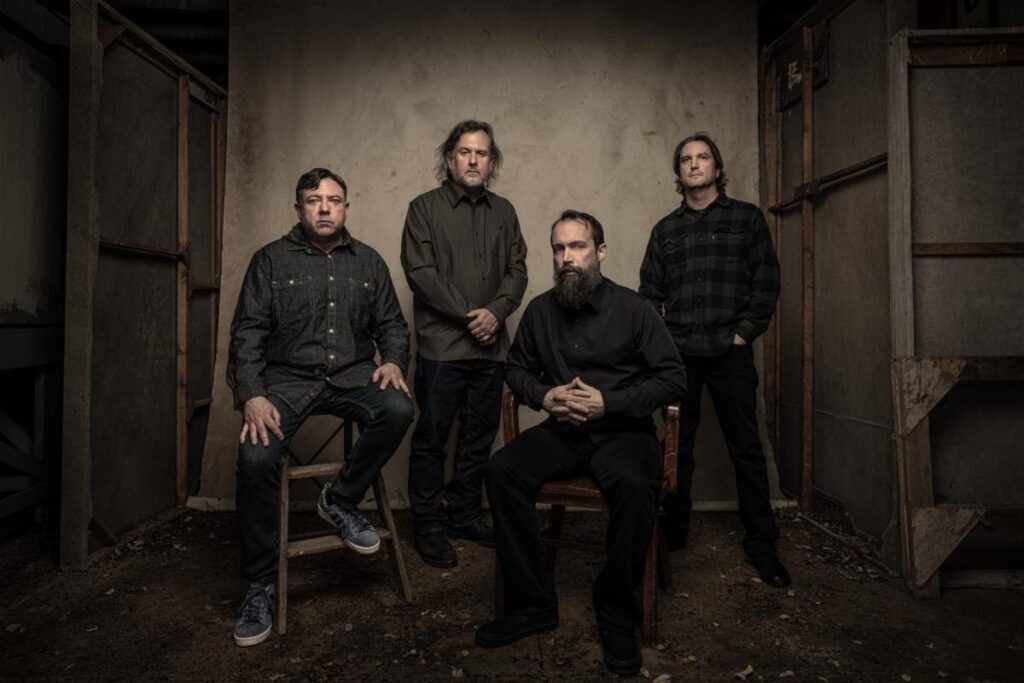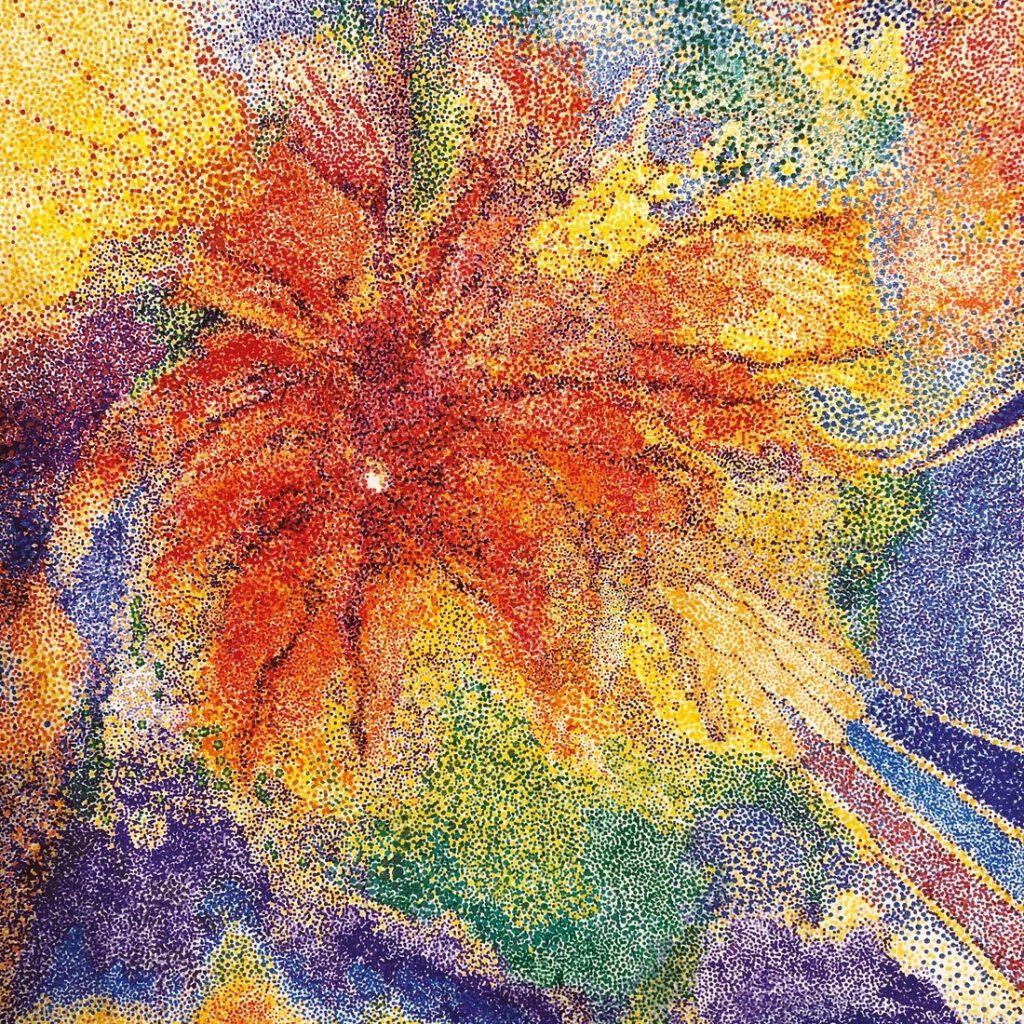
I’ve tried convincing a lot of editors at a lot of different publications to let me write about Clutch over the years, mostly to no avail. They’re one of my favorite bands, and easily one of the bands I’ve seen play live the most. But the long-running Maryland quartet of Neil Fallon, Tim Sult, Jean-Paul Gaster, and Dan Maines remains resolutely critic-proof. I’ve never met a fellow music writer, much less an assigning editor, who’s as obsessed with them as I am. I think as much of that comes down to their intrinsic uncoolness as it does their eternal square-peggedness.
Clutch aren’t a metal band, though their fanbase is chock full of metalheads. They’re not really an alt-rock band, either, despite the rapturous response for Dinosaur Jr. on the pair’s co-headlining run last summer. Some of their best-known work is, roughly speaking, blues rock, but you don’t see a lot of behatted Stevie Ray Vaughan dads at their shows. They don’t fit into any neat and tidy narratives about the history of rock music. In both their stubborn singularity and the steadfast devotion of their fans, Clutch have become something like the Phish of hard rock.
This weekend marks the 20th anniversary of Blast Tyrant, the mid-career reset that arguably put Clutch on their current path. It’s a bluesy, bruising hard-rock masterpiece, but the yarling post-grunge and candy-coated nü metal that dominated rock radio at the time ensured that it was never going to be a mainstream hit. In truth, there was probably no point in history when it would have been. Blast Tyrant represented a significant streamlining for a band who had spent the ’90s and early 2000s making uncategorizable, often bizarre music — the only song of theirs I ever heard on the radio was “Careful With That Mic,” a rap-metal piss-take that sounded like Aesop Rock fronting Kyuss. But while Blast Tyrant was the most focused and robust Clutch record to date, it was still a Clutch record. Neil Fallon’s high-low lyrical logorrhea was as unhinged as ever. (e.g.: “Condoleezza Rice is nice/ But I prefer -a-Roni.”) The album had songs called “Spleen Merchant” and “(In The Wake Of) The Swollen Goat,” and it closed with a breezy, colossally unbothered instrumental called “WYSIWYG.” Blast Tyrant certainly won the band new fans, but those fans were joining a cult, not starting a movement.
If Blast Tyrant initiated a new generation of Clutch fans, it did it in part by doubling down on what Clutch did best on their earlier, woolier albums. That starts with the streak of absurdist humor that runs through Fallon’s lyrics. In some of Clutch’s signature songs from the ’90s, the frontman embodies a redneck samurai (“A Shogun Named Marcus”), a long-haul trucker who preaches the gospel on the CB radio (“The House That Peterbilt”), and a stoner driving his Dodge into outer space, decades before Tyrese and Ludacris did it in Fast 9 (“Spacegrass”). The ’90s were a golden age for oddball rock lyrics, but even in that context, Fallon was an outsider. His dense, reference-heavy writing style had more in common with underground hip-hop than anything that that was happening on Headbanger’s Ball, and his goofball delivery set him apart from the grim self-seriousness of grunge and hardcore. (Clutch’s pre-LP era, sonically if not spiritually, was essentially hardcore punk.)
While Clutch were far from the only heavy band to use humor – my profuse apologies to Mike Patton – the way they used it could make it feel like a secret handshake. To the uninitiated, the repeated incantation from “Texan Book Of The Dead” is just plain dumb. To Clutch fans, “Oo ee oo ah ah/ Twing twang walla walla bing bang” is one of the night’s biggest singalong moments whenever the band busts the song out. After a couple hits of spacegrass, it might even seem deep. I’m reminded of Chris DeVille’s news post on Phish’s Gamehendge set from this past New Year’s Eve: “The music tells the story of a retired Long Island military man named Colonel Forbin who enters the mythical land of Gamehendge and rescues the Helping Friendly Book from an evil dictator named Wilson.” That sounds fucking stupid to me, but I know the Phishheads must have been losing their goddamn minds. Clutch weaponize that same dichotomy.
The puckishness carries into the music itself. Sult, Maines, and especially the Buddy Rich-worshiping Gaster are renowned as masters of their instruments, but they don’t carry themselves like virtuosos. Sometimes they feel like the loosest in-the-pocket band in the world, locking to the groove while finding endless, fascinating ways to meander around its edges. When they play with a keyboardist, the songs open up even more, with the keys holding down melody lines so Sult can unleash probing, smoldering licks. In the mid-2000s, they’d even occasionally invite a harmonica player onstage to honk on Bobo during some of their bluesier numbers. Whatever they decide to play, and however they decide to play it, they consistently achieve nirvana without looking for perfection. A Clutch show feels nothing like a Dream Theater show, but you can see the same level of technical brilliance on display at both.
There are a few even more overt jam-band aspects to the Clutch live show. For one thing, they jam. The definitive versions of songs like “Gravel Road” and “Spacegrass” are extended live takes, and “7 Jam” is different every time you hear it. Even when they stick to the script, Clutch tend to insert a little extra breathing room into the songs, leaving space for moments of happenstance. (Their one explicitly jam-based studio album, 1999’s Jam Room, is probably their worst, but it’s been growing on me lately.) On the unofficial trilogy of Blast Tyrant, 2005’s Robot Hive/Exodus, and 2007’s From Beale Street To Oblivion, they really seemed to be writing to the openness of the live stage. The songs started drawing from country, blues, and jazz music more than stoner rock and alt-metal. The following album even had a go-go song, the incredible “D.C. Sound Attack!” All those songs absolutely smoke when Clutch play them live.
Of course, you never know if you’re going to see a given song live. Clutch’s most crucial link to the jam-band world might be their approach to setlists. When I started seeing Clutch, I was a broke teenager, but I knew that if I could scrape together enough money for two shows, I’d get to see two completely different sets. They pluck songs from all their albums with no regard to their relative popularity. There are songs that they play a lot – “Spacegrass,” “The Mob Goes Wild,” “Electric Worry” – but there are no sure things and no staples. According to setlist.fm, I saw “Opossum Minister” one of only four times they’ve ever played it. That’s fun! The band plays into the fan set list obsession by posting each one on Instagram right after the show. I check those posts religiously, whether I’m seeing Clutch on that particular run or not. They’ve got me.
Clutch consciously cultivate that kind of obsession, but sometimes the narrative gets away from them. That opens the door to some of the very best parts about being a Clutch fan. I vividly remember the first time I was told by an older wook at a Clutch show that they can’t play their 1993 classic “Binge And Purge” anymore because it always led to riots. (The “Come on, motherfucker/ Let’s throw down” refrain does make me want to fight somebody, to be fair.) Whether the police actually told the band they couldn’t play it, or they just decided it would be prudent not to, I can’t recall. But this became a treasured piece of band lore for me and my friends, weighted with the authority of absolute truth. I heard this nugget a dozen more times through the 2000s before Clutch rendered it irrelevant by playing “Binge And Purge” in Salt Lake City in 2009. I’ll always love Clutch’s records, but being a part of something weird and contrarian and cultish and inscrutable to outsiders is why they’re so close to my heart. Now, come on, motherfucker, let’s throw down.



